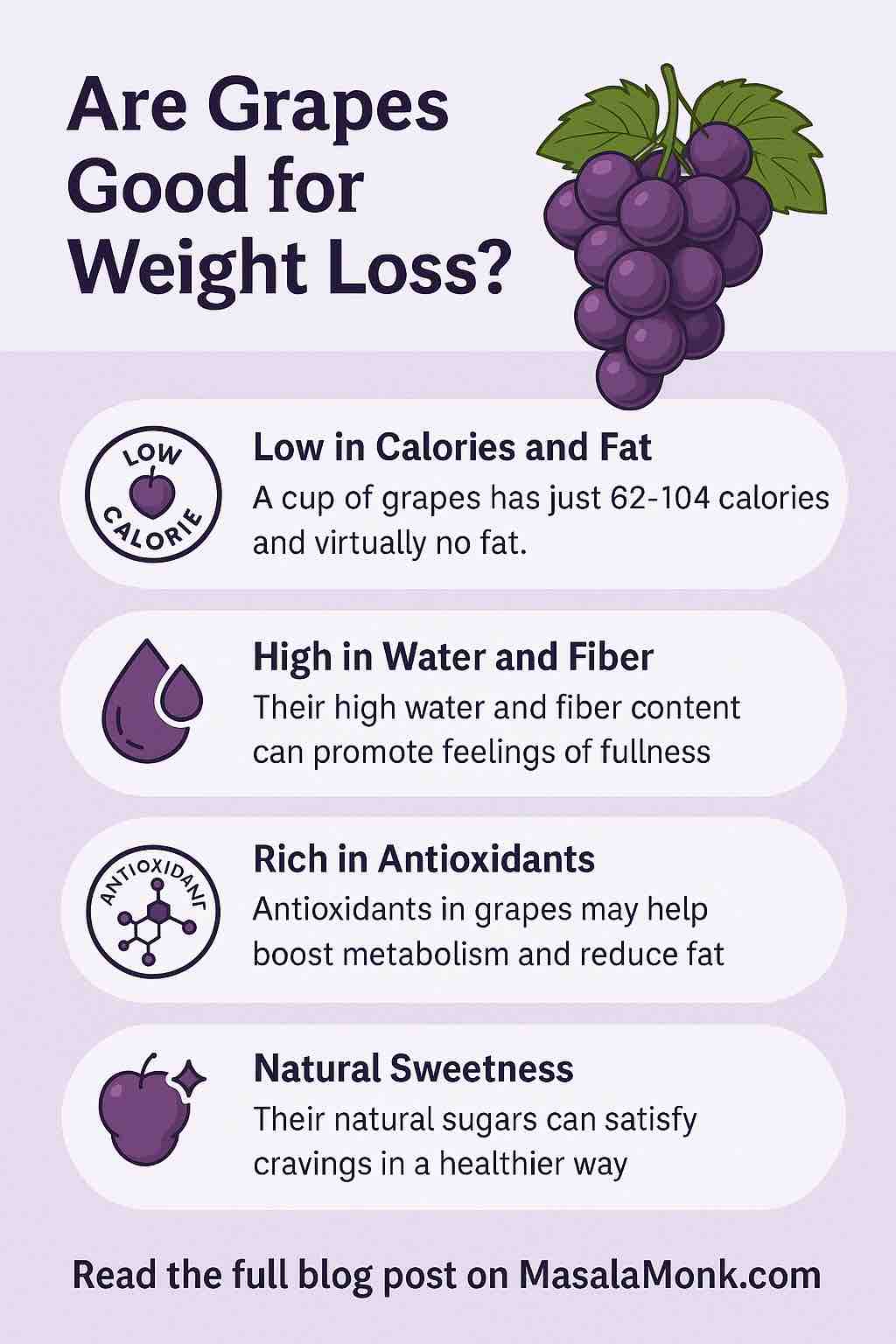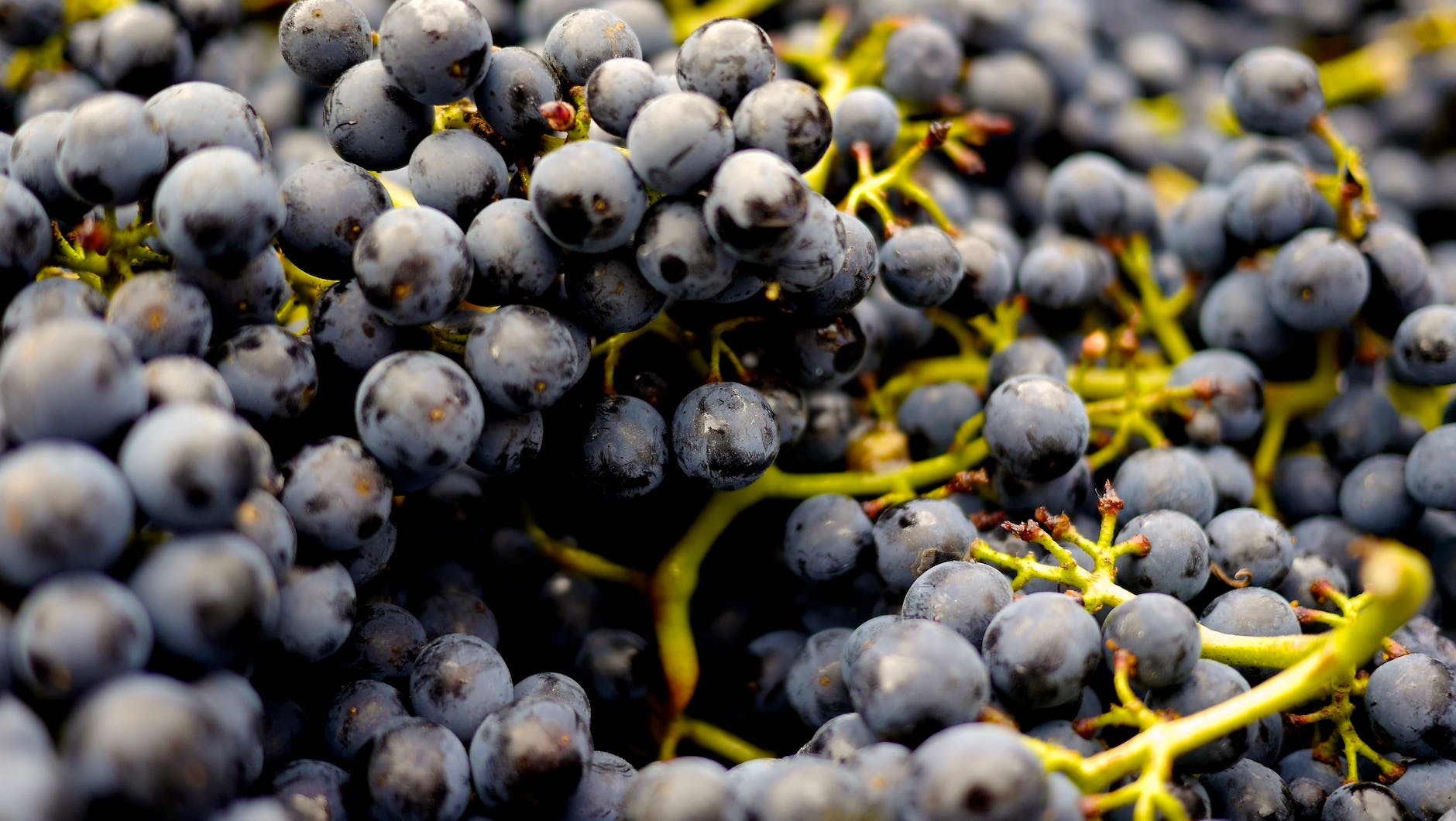
Weight loss can often feel like a battle between cravings and calories, and choosing the right foods plays a crucial role in the journey. Among fruits, grapes are one of the most popular—sweet, hydrating, and conveniently bite-sized. But are grapes good for weight loss? Let’s dive deep into the science, nutrition facts, benefits, and smart strategies to include grapes in your diet without sabotaging your goals.
Why Grapes Are a Weight Loss-Friendly Fruit
1. Low in Calories, High in Satisfaction
A cup of grapes contains only about 62 to 104 calories, depending on the variety. They’re naturally fat-free and cholesterol-free, making them a guilt-free snack. Their juicy texture and natural sweetness satisfy sugar cravings without turning to processed junk foods.
2. High Water and Fiber Content
Grapes are composed of over 80% water, helping you stay hydrated while keeping you full. They also contain dietary fiber, which slows digestion and increases satiety. The fiber-water combo helps reduce overall calorie intake by curbing overeating.
3. Natural Sugars That Don’t Spike Your Blood Sugar
Despite their sweet taste, grapes have a low to medium glycemic index. Their sugar is balanced by fiber and water, helping to prevent spikes in blood sugar when eaten in moderation. This makes them a safer fruit for people managing insulin sensitivity or type 2 diabetes.
4. Antioxidant Powerhouse
Grapes—especially red and black varieties—are rich in antioxidants like resveratrol, flavonoids, and ellagic acid. Studies suggest that resveratrol may play a role in reducing fat storage, improving insulin sensitivity, and increasing metabolism. While more human research is needed, these compounds could indirectly support weight loss.
How Grapes Can Help You Beat Cravings and Emotional Eating
Frozen Grapes: Nature’s Candy
Freezing grapes creates a texture and flavor experience that’s incredibly satisfying. Many dietitians recommend frozen grapes as a low-calorie, high-satiety alternative to ice cream or candy. The slow eating process helps you feel satisfied with less.
Mindful Snacking Made Easy
Their small size makes grapes ideal for portion-controlled snacking. Eating them one by one encourages mindfulness and reduces the chances of mindless eating that often accompanies other snack foods.
Potential Drawbacks to Keep in Mind
Portion Control is Key
Because grapes are easy to eat in large quantities, it’s important to stick to reasonable servings. Overeating them can lead to consuming excess calories, and some people may experience digestive discomfort like gas or bloating if they eat too many.
Sugar Content in Context
While grapes contain natural sugars, they still count toward your daily sugar intake. If you’re following a low-sugar diet, be sure to account for them accordingly.
Smart Ways to Add Grapes to a Weight Loss Diet
- Snack Smart: Keep pre-portioned containers of grapes in the fridge for easy grab-and-go snacking.
- Salad Boost: Add halved grapes to green salads for a pop of sweetness that balances savory flavors.
- Breakfast Add-On: Mix grapes with Greek yogurt, oats, or cottage cheese for a balanced and satisfying breakfast.
- Smoothie Ingredient: Throw in a handful of grapes to add natural sweetness to your post-workout smoothie.
Bottom Line: Are Grapes Good for Weight Loss? Absolutely — When Eaten Right
Grapes are not just a delicious treat; they’re a powerhouse of hydration, fiber, and antioxidants. When consumed in moderation and integrated into a balanced diet, grapes can support weight loss by satisfying cravings, promoting fullness, and adding nutritional value to meals.
So next time you’re looking for a sweet, juicy snack that won’t derail your goals, reach for a bunch of grapes. Your waistline (and your taste buds) will thank you.
FAQs: Grapes and Weight Loss
1. Can I eat grapes every day and still lose weight?
Yes, you can enjoy grapes daily as part of a calorie-controlled diet. Just be mindful of portion sizes—about 1 cup per day is a good starting point.
2. How many grapes should I eat for weight loss?
A serving of 15–20 grapes (about 1 cup or 150g) is typically enough to satisfy cravings without adding too many calories.
3. Are green grapes better than red grapes for weight loss?
Both are low in calories and high in nutrients, but red grapes contain more antioxidants like resveratrol, which may offer additional metabolism-boosting benefits.
4. Do grapes cause belly fat?
Not inherently. Grapes are low in fat and calories. Belly fat is caused by excess calorie intake from any source—grapes only contribute if overconsumed.
5. Can grapes be part of a low-carb or keto diet?
Grapes are relatively high in natural sugars and not ideal for strict keto diets. However, they can fit into a moderate or flexible low-carb eating plan.
6. Are grapes good for post-workout recovery?
Yes! Grapes offer quick-digesting natural sugars and antioxidants that help replenish glycogen stores and reduce inflammation after exercise.
7. Do grapes help burn fat?
While grapes don’t directly burn fat, compounds like resveratrol may support metabolic health and fat regulation over time.
8. Can grapes help reduce sugar cravings?
Absolutely. Their natural sweetness makes them an excellent alternative to candy or desserts, helping you manage sugar cravings healthfully.
9. Are dried grapes (raisins) as good for weight loss as fresh grapes?
Raisins are more calorie-dense and contain less water and fiber, so portion control is even more important when consuming them.
10. Is it better to eat grapes in the morning or at night for weight loss?
There’s no perfect time, but eating them earlier in the day or as a pre-workout snack may help fuel activity and prevent late-night sugar binges.












